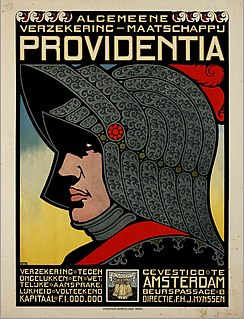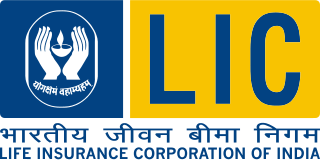
Insurance is a means of protection from financial loss. It is a form of risk management, primarily used to hedge against the risk of a contingent or uncertain loss.
Life insurance is a contract between an insurance policy holder and an insurer or assurer, where the insurer promises to pay a designated beneficiary a sum of money in exchange for a premium, upon the death of an insured person. Depending on the contract, other events such as terminal illness or critical illness can also trigger payment. The policy holder typically pays a premium, either regularly or as one lump sum. Other expenses, such as funeral expenses, can also be included in the benefits.

Financial services are the economic services provided by the finance industry, which encompasses a broad range of businesses that manage money, including credit unions, banks, credit-card companies, insurance companies, accountancy companies, consumer-finance companies, stock brokerages, investment funds, individual managers and some government-sponsored enterprises. Financial services companies are present in all economically developed geographic locations and tend to cluster in local, national, regional and international financial centers such as London, New York City, and Tokyo.
Health insurance is an insurance that covers the whole or a part of the risk of a person incurring medical expenses, spreading the risk over a large number of persons. By estimating the overall risk of health care and health system expenses over the risk pool, an insurer can develop a routine finance structure, such as a monthly premium or payroll tax, to provide the money to pay for the health care benefits specified in the insurance agreement. The benefit is administered by a central organization such as a government agency, private business, or not-for-profit entity.

American International Group, Inc., also known as AIG, is an American multinational finance and insurance corporation with operations in more than 80 countries and jurisdictions. As of December 31, 2016, AIG companies employed 56,400 people. The company operates through three core businesses: General Insurance, Life & Retirement, and a standalone technology-enabled subsidiary. General Insurance includes Commercial, Personal Insurance, U.S. and International field operations. Life & Retirement includes Group Retirement, Individual Retirement, Life, and Institutional Markets.
Vehicle insurance is insurance for cars, trucks, motorcycles, and other road vehicles. Its primary use is to provide financial protection against physical damage or bodily injury resulting from traffic collisions and against liability that could also arise from incidents in a vehicle. Vehicle insurance may additionally offer financial protection against theft of the vehicle, and against damage to the vehicle sustained from events other than traffic collisions, such as keying, weather or natural disasters, and damage sustained by colliding with stationary objects. The specific terms of vehicle insurance vary with legal regulations in each region.
Reinsurance is insurance that an insurance company purchases from another insurance company to insulate itself from the risk of a major claims event. With reinsurance, the company passes on ("cedes") some part of its own insurance liabilities to the other insurance company. The company that purchases the reinsurance policy is called a "ceding company" or "cedent" or "cedant" under most arrangements. The company issuing the reinsurance policy is referred simply as the "reinsurer". In the classic case, reinsurance allows insurance companies to remain solvent after major claims events, such as major disasters like hurricanes and wildfires. In addition to its basic role in risk management, reinsurance is sometimes used to reduce the ceding company's capital requirements, or for tax mitigation or other purposes.

The Allstate Corporation is an American insurance company that is in the United States. The company also has personal lines insurance operations in Canada. Allstate was founded in 1931 as part of Sears, Roebuck and Co., and was spun off in 1993. The company has had its headquarters in Northfield Township, Illinois, near Northbrook since 1967.
State Farm is a large group of insurance and financial services companies throughout the United States with corporate headquarters in Bloomington, Illinois.

Tokio Marine Holdings, Inc., is a multinational insurance holding company headquartered in Tokyo, Japan. It is the largest property/casualty insurance group in Japan in terms of revenue and is the parent company for the Tokio Marine Group which employs 39,000 people in 38 countries worldwide.

Life Insurance Corporation of India (LIC) is an Indian State owned insurance group and investment corporation owned by the Government of India.
The Life Insurance Corporation of India was founded in 1956 when the Parliament of India passed the Life Insurance of India Act that nationalised the insurance industry in India. Over 245 insurance companies and provident societies were merged to create the state owned Life Insurance Corporation.
A mutual insurance company is an insurance company owned entirely by its policyholders. Any profits earned by a mutual insurance company are either retained within the company or rebated to policyholders in the form of dividend distributions or reduced future premiums. In contrast, a stock insurance company is owned by investors who have purchased company stock; any profits generated by a stock insurance company are distributed to the investors without necessarily benefiting the policyholders.
Insurance Australia Group Limited (IAG) is a multinational insurance company headquartered in Sydney, Australia.
Insurance in India refers to the market for insurance in India which covers both the public and private sector organisations. It is listed in the Constitution of India in the Seventh Schedule as a Union List subject, meaning it can only be legislated by the Central Government only.

Farmers Insurance Group is an American insurer group of automobiles, homes and small businesses and also provides other insurance and financial services products. Farmers Insurance has more than 48,000 exclusive and independent agents and approximately 21,000 employees. It is a subsidiary of the Swiss company Zurich Insurance Group.
Australia's insurance market can be divided into roughly three components: life insurance, general insurance and health insurance. These markets are fairly distinct, with most larger insurers focusing on only one type, although in recent times several of these companies have broadened their scope into more general financial services, and have faced competition from banks and subsidiaries of foreign financial conglomerates. With services such as disability insurance, income protection and even funeral insurance, these insurance giants are stepping in to fill the gap where people may have otherwise been in need of a personal or signature loan from their financial institution.

The Korea Deposit Insurance Corporation (KDIC) is a deposit insurance corporation, established in 1996 in South Korea to protect depositors and maintain the stability of the financial system. The main functions of KDIC are insurance management, risk surveillance, resolution, recovery, and investigation.

Allianz SE is a German multinational financial services company headquartered in Munich, Germany. Its core businesses are insurance and asset management. As of 2014, it is the world's largest insurance company, the largest financial services group and the largest company according to a composite measure by Forbes magazine, as well as the largest financial services company when measured by 2013 revenue. The company is a component of the Euro Stoxx 50 stock market index.
The Western Australian Development Corporation (WADC) was a trading corporation established in 1983 by the first Burke Ministry of Western Australia. It enabled the state Labor government to involve itself in large-scale business transactions without the normal transparency and accountability of government-guaranteed corporations, and was part of what became known as WA Inc. It appointed John Horgan chairman on a salary of $800,000 p.a., and formed subsidiaries including Exim Corporation which sought to create and exploit export markets for education and other products. The enabling Act provided that "(4.3) The Corporation is an agent of the Crown in right of the State and enjoys the status, immunities and privileges of the Crown..." while "(4.4) Notwithstanding subsection (3), the Corporation shall not be subject to direction by the Minister..."
[T]o make sure he kept secret the dealings of the WADC and its shady subsidiaries such as Exim Corporation, [Burke] pushed through legislation that not only gave them commercial confidentiality but unshackled them from ministerial accountability. The WADC was just one of many Burke creations synonymous with the corporatism of the WA Inc era -- a failed political strategy that folded high-risk business into unethical government and led to financial and social upheaval still resonating a quarter of a century later.









